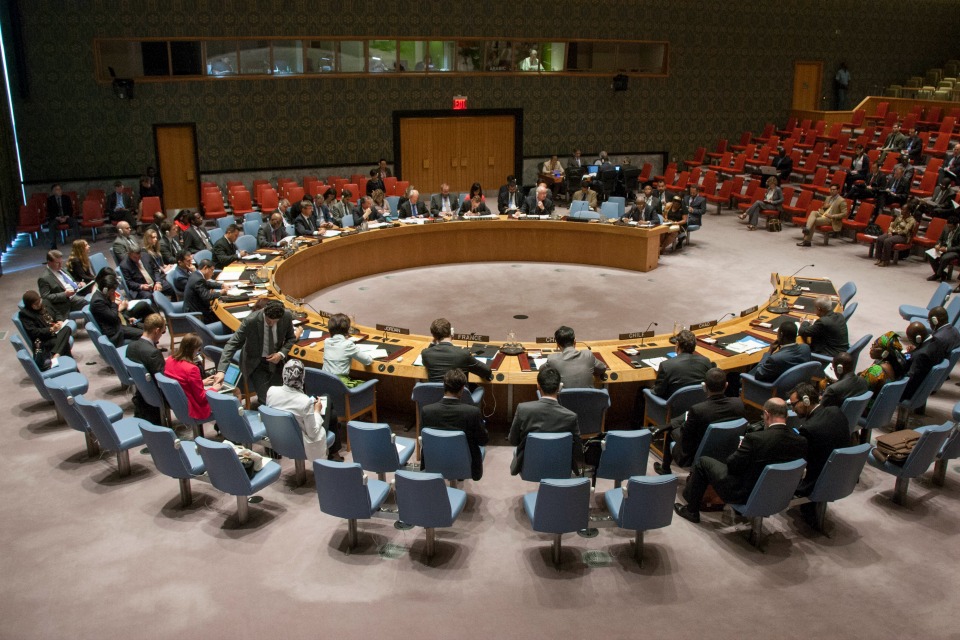"The work of these Committees forms a vital part of the global response to terrorism."
Statement by Ambassador Matthew Rycroft of the UK Mission to the UN at the Security Council Briefings by Chairs of Subsidiary Bodies

Thank you Mr President.
I welcome this opportunity to review the Council’s subsidiary bodies on counter terrorism, weapons of mass destruction and the sanctions regime against Al Qaida and its affiliates. I thank our briefers for the comprehensive overview that they have just given and the hard work they do on our behalf alongside their day job representing their countries at this Council.
As so many recent terrorist atrocities have shown, we now face threats to international peace and security that our predecessors would have scarcely imagined when writing the UN Charter 70 years ago. Attacks like the one attempted against tourists in Egypt just last week show that our citizens can now be targeted wherever they are in the world. These threats destroy lives, and fundamentally challenge our efforts to preserve stability and further development across the globe.
The work of the three Committees forms a vital part of the global response. Together, we can stop dangerous individuals travelling abroad to perpetrate these heinous acts. We can freeze their assets and halt their financing of terror. And we can help deny them access to an even more dangerous arsenal of dirty bombs and chemical weapons.
So the Committees, and their UN experts, are a crucial tool and a resource for this Council. I reiterate the United Kingdom’s full support for their work. Let me now address each Committee in turn.
First, in the Counter Terrorism Committee chaired by Raimonda, we welcome the recent reporting by the Counter Terrorism Executive Directorate on foreign terrorist fighters and other issues. Such analysis helps all member states understand the global risk we face and builds our collective will for global action.
As we heard in last month’s Council debate, countering extremist narratives is a major challenge for us all. We welcome the Committee’s growing focus on this issue, and trust that countering violent extremism will remain a priority for the Committee in the future. We look forward to the Committee adding to the countering violent extremism action plan recently announced by the Secretary-General. We hope this will include clear metrics for success and quick-win capacity building ideas.
Second, the committee that Gerard chairs, let me reiterate support for the work of the Al Qaeda sanctions Committee. This regime remains a key tool for the Security Council to disrupt the sickening activities of ISIL and Al Qaeda groups.
But to do so, all states need to fulfil their obligations under the terms of the regime. And the list needs to remain agile to evolving threats. So, we commend the work of the Al Qaeda Monitoring Team and their analysis shared with the Council – including its most recent in-depth report on foreign terrorist fighters.
That report gave this Council a valuable understanding of the sheer scale of foreign terrorist fighter flows; an estimated 25,000 fighters originating from over half of the UN’s members.
Fair and clear procedures for the sanctions regime are also needed to keep the list effective and current. We join the Chair in thanking Kimberly Prost for her sterling service as Ombudsperson. Her work has helped to maintain the legitimacy and effectiveness of this important tool.
Third, let me turn to non-proliferation and Resolution 1540, the Committee chaired by Roman. The threat of non-state actors, particularly terrorists, acquiring weapons of mass destruction is a nightmare scenario for us all. Today’s complex conflicts and rapidly evolving technology make effective implementation of 1540 an imperative if we are to reduce the chance of this ever happening.
I’d like to take this opportunity to thank the 1540 Group of Experts and the UN Office for Disarmament Affairs for their tireless work helping states comply with the resolution. But more needs to be done. We urge all states to approach the Committee to offer, or request, support for national implementation. And to those 19 states that have yet to provide a national implementation report, let us be clear in our calls on them to do so.
We also look forward to starting work on the Comprehensive Review of implementation for 1540, under the leadership of Spain. We invite all UN member states to consider how the Committee’s work can be strengthened, including through implementation monitoring, assistance matchmaking and outreach.
Mr President,
I was pleased to hear today’s briefing on the growing cooperation between these three important subsidiary bodies. When resources are limited, joint activities such as country visits can save money and add value. We welcome further innovations such as these in the future.
Thank you Mr President.